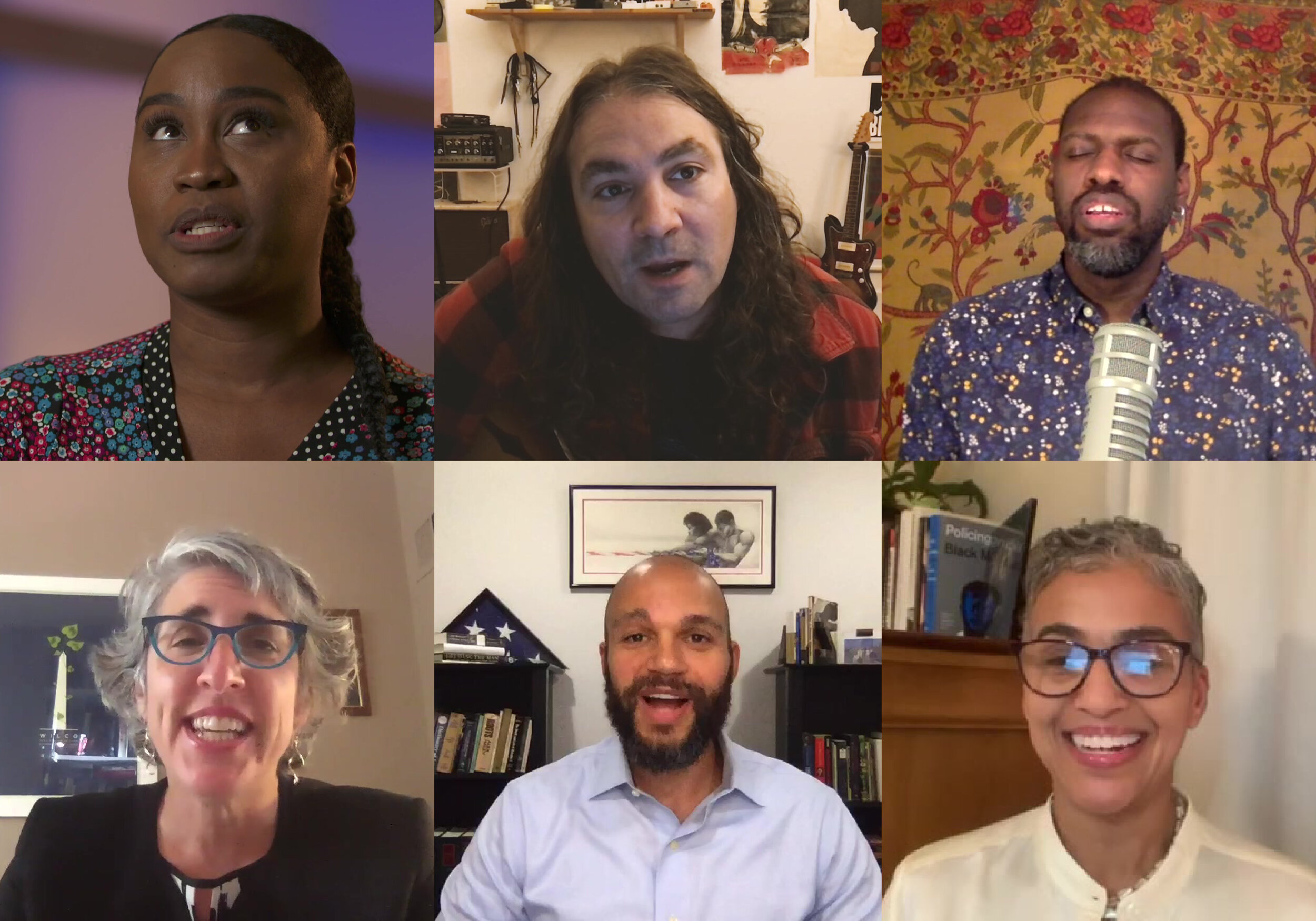Ms. Kassa is a Ward 4 resident, a single mother of 3, and an immigrant to the U.S. from Ethiopia, and a restaurant entrepreneur who was sued by the commercial landlord of the restaurant she co-founded just months before the pandemic started.
Ms. Silver is a Ward 7 resident, 36-year-old African American, single mother of three who faced an obstacle to getting a job due to a problem on her credit report.
Mr. Green is a disabled DC resident living on monthly Supplemental Security Income of less than $800, who was victimized by identity theft in connection with COVID-19 benefits.
These are just three of the hundreds of clients whose problems Tzedek DC has been working to help solve as the public health emergency has continued throughout the first half of 2021.
Read more about these matters and others in our 2021 updates below on our work in each of our interconnected areas of priority: legal services, systemic reform (including a major debt collection bill that we helped champion and was passed yesterday!), and community outreach.
Now entering its sixteenth month, the COVID-19 pandemic’s overlapping public health and financial crises are continuing to generate a toxic combination of reduced income, increased debt, and increased account delinquencies for DC residents. Please look out for volunteer opportunities this fall as thousands of new cases are filed once the current emergency moratoria expire; join us for Eat Well, Do Justice on September 13, 2021, at 6 pm, and follow us on Facebook and Twitter. With unprecedented challenges facing our client community, we are especially thankful this year for your ongoing support.
Legal Services
In a classic pandemic legal services moment, Tzedek DC Client Norris and Director Ariel Levinson-Waldman FaceTime Volunteer Staff Attorney Josh Levin.
Ms. Kassa, an immigrant from Ethiopia with US citizenship, is a single mother of three living in Ward 4. Ms. Kassa and three other people opened a franchise restaurant called “Butter Chicken Company.” The business entered into a lease agreement for commercial restaurant space in Columbia Heights effective from August 2019 to October 2024. Ms. Kassa signed a Guaranty Agreement and is therefore personally liable for any breach of the lease agreement.
Due to the pandemic, the restaurant was closed from March-October 2020. Since Butter Chicken reopened in November 2020, Ms. Kassa has been working there without pay this year (and living solely on unemployment benefits), because the restaurant is currently making only a quarter of its pre-COVID-19 income—not nearly enough to pay the rent and cover other expenses.
The landlord filed a complaint for breach of contract against the business and all four owners, including Ms. Kassa. He was seeking $146,100 in damages, plus attorneys’ fees and court costs, and also reserved his right to seek damages for the remainder of the lease term. Ms. Kassa reached out to a community nonprofit that referred her to Tzedek DC.
Her savvy Tzedek DC attorney, Jorge Tormes, advised Ms. Kassa about the Small Business Administration (SBA) and its COVID-19 assistance for small businesses, alerting her to both the Paycheck Protection Program and the Restaurant Revitalization Fund. As a result of Jorge’s advice, Butter Chicken Company was able to get enough money from the SBA to cover the past-due rent.
Since the start of 2021, we have helped nearly 400 DC residents with debt-related legal problems, securing relief that saved clients an average of over three weeks’ worth of wages at the DC minimum wage.
When the current emergency prohibitions on new debt collection lawsuits, garnishments, and attachments end in September 2021, thousands of DC residents will be swamped by debt collection, litigation, and credit report impairment problems. In fact, Tzedek DC is already being called upon to help residents navigate legal and financial issues arising from COVID-19, as exemplified by our client Ms. Kassa.
Our clients also continue to experience non-pandemic-related issues, as in the following two cases:
Ms. Silver is a 36-year-old African American, single mother of three, and resident of Ward 7. She received a job offer from a government contractor for a position paying significantly more than she was currently earning. However, that offer was contingent upon her passing a background check, and during her background check, an alleged debt to a prior landlord was flagged for review. Ms. Silver asked Tzedek DC to help her sort things out. After reviewing the credit report that had been generated for her background check, staff attorney A.J. Huber determined that the credit report was falsely listing a monetary judgment that had never, in fact, been awarded to the prior landlord. Ms. Silver then retained Tzedek DC to help her dispute the credit report under the Fair Credit Reporting Act (the “FCRA”). Because such a dispute takes at least 30 days to resolve, A.J. also wrote a letter to the person conducting the background check, stating the services that Tzedek DC was providing and why he believed the information was incorrect. Although the FCRA dispute has not yet been resolved, Ms. Silver recently informed A.J. that she had passed her background check and would soon be starting her new job. Ms. Silver fervently thanked A.J. for working with her and for being “available for low-income people, especially the ones who want to change their circumstances.”
Mr. Green is a 57-year-old disabled man with unstable housing in DC living on monthly Supplemental Security Income of less than $800. He was in an inpatient addiction rehabilitation facility when the COVID-19 stimulus payments were announced. Since he doesn’t file a tax return because his income is low, to receive a stimulus payment he was required to complete a form on the IRS website. Not being computer literate, Mr. Green relied on a fellow resident at the rehab center who was “good with computers.” However, the resident inserted his own bank account information instead of Mr. Green’s into the application form, thereby diverting the payment from Mr. Green’s account. Mr. Green’s case remains ongoing and he is working with staff attorney John Blake.
Tzedek DC’s overarching goals continue to be preventing client households from falling into the economic abyss and keeping them on the ladder towards financial stability.
Systemic Reform
Tzedek DC Staff Attorney John Blake testifies to DC Council in support of eviction record sealing.
Through our coalition-based advocacy, we have made substantial progress on several systemic reforms over the past six months.
Most recently, in a long-term systemic reform effort culminating in yesterday’s vote in the Council, Tzedek DC and coalition allies, in collaboration with DC Council Chair Phil Mendelson and Attorney General Karl Racine, catalyzed major changes in DC’s debt collection laws. The reforms expand the scope of the protections, strengthen anti-harassment measures, limit punitive actions that can be taken against DC residents facing debt collection suits, address the underlying causes of default judgments, and reform statute of limitations rules to prevent so-called “zombie debt.” Tzedek DC’s explainer is here. In celebrating this step, Attorney General Racine emphasized: “As @TzedekDC says: ‘Too often in connection with debt collection, residents are fearful that their savings may be wiped out, their wages garnished, or even that they may face arrest.’”
Further, building on our initial success in reforming DC’s wealth-based driver’s license system in 2019, we released a report in April titled “Driving DC to Opportunity,” aimed at ending DC’s policy of punishing residents with unpaid fines or fees by disqualifying them from renewing their licenses. The report highlights real-life stories from DC residents impacted by this discriminatory “Clean Hands” law, which in effect ties the right to drive to wealth, and places obvious burdens on those who cannot afford to pay. The report and our coalition-based advocacy campaign—with 34 coalition partners including the ACLU, Bread for the City, The Arc/Skyland Workforce Center, Color of Change, and dozens of others, has gathered extensive media coverage and paved the way for two bills that were introduced in the DC Council in the weeks following the report.
In March, the federal government took actions to end the inclusion of credit history and credit scores in evaluating immigrants—criteria that had previously been mandated under the Public Charge Rule promulgated by the U.S. Department of Homeland Security (DHS). Tzedek DC was one of several consumer, anti-poverty, and civil rights groups that sued the DHS over the Public Charge Rule.
Soon after the pandemic hit DC, we and our coalition partners successfully advocated for crucial emergency protections like moratoria on debt collection, wage garnishments, bank seizures, evictions, and utility cut-offs, as well as foreclosure protections. In addition, we obtained a first-of-its-kind right to file a COVID-19 credit report alert, which prevents end-users of one’s report from factoring in missed or late payments that occurred due to pandemic-related hardship.
Building on all this advocacy work, Tzedek DC has testified to the DC Council numerous times over the past six months in support of issues such as:
Community Outreach
Community Outreach & Communications Consultant Naomi Ayala, Associate Director Sarah Hollender, and Senior Advisor Janet Lowenthal present a Sin Deudas, Sin Dudas training at CARECEN.
Community partnerships have allowed us to disseminate actionable debt- and credit-related guidance to over 100,000 DC residents over the past four years, and we will continue to expand this transformative work in the years ahead.
Already in 2021, for example, we have hosted staff trainings for partners like the United Planning Organization, the DC Affordable Law Firm, and the DC Volunteer Lawyers Project. We have also hosted webinars for community members in conjunction with Capital Area Asset Builders, the Jewish Foundation for Group Homes, and Sinai House.
Likewise, our community outreach campaign, “¡Sin Deudas, Sin Dudas!”, or “No Debts, No Doubts!”, continues to promote financial empowerment in both English and Spanish through a combination of webinars, digital and print ads, and radio PSAs. The outreach also contributes to the goal of increasing community awareness and use of our legal services. So far in 2021, we have developed three bilingual “knowledge tools” as part of our Partner Toolkit for organizational allies. These engaging one-pagers offer DC residents timely, accessible and actionable information on credit, debt, scams, and fraud. We have also printed a bilingual business card, stating the availability of our free legal services for problems of debt and credit management. Our fully vaccinated Spanish-speaking staff members will soon begin distributing these in the community, with a focus on Ward 1, and MOLA’s “Mercado Movil” in Ward 7.
Our Spanish language campaign offers a template, lessons learned, and helpful contacts to expand our outreach work to the city’s larger English-speaking, primarily Black community under the moniker “No Debts, No Doubts!” To begin with, we are making the “knowledge tools” available both in hard copy and electronically. We will also offer our growing series of presentations, now via webinar but hopefully soon in person, on various aspects of credit and debt—beginning with the Petworth Neighborhood Library, which is eager to host our workshops.
Our Disabilities Community Project, launched in January 2020 and led by Staff Attorney Marissa Ditkowsky, enables us to focus more intentionally on meeting the particular needs of this client community, whose members often have difficulties accessing information, face widespread discrimination throughout law enforcement, and have been particularly vulnerable in the pandemic. The project has produced training materials for working with individuals with disabilities, trained allied service providers, and offered financial and legal education sessions at the D.C. Library’s Center for Accessibility, Sinai House, and Project ACTION!, plus another in Spanish (as part of our Sin Deudas, Sin Dudas program) through the DC Developmental Disabilities Council. In June, we also launched an eight-week series of workshops for the Jewish Foundation for Group Homes residents. In its first 14 months, the project saved 85 clients a total of almost $53,000 and indirectly impacted thousands more through changes successfully proposed to court-based rules and procedures.









